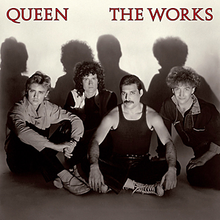The Works (Queen album)
| The Works | ||||
|---|---|---|---|---|
 |
||||
| Studio album by Queen | ||||
| Released | 27 February 1984 | |||
| Recorded | August 1983 – January 1984 | |||
| Studio | Record Plant Studios, Los Angeles, California and Musicland Studios, Munich, Germany | |||
| Genre | Rock | |||
| Length | 37:11 | |||
| Label |
EMI / Parlophone Capitol (1984) / Hollywood (1991) (US) |
|||
| Producer | Queen, Reinhold Mack | |||
| Queen chronology | ||||
|
||||
| Singles from The Works | ||||
|
||||
| Professional ratings | |
|---|---|
| Review scores | |
| Source | Rating |
| Allmusic | |
| Chicago Tribune | |
| Encyclopedia of Popular Music | |
| Rolling Stone | |
| The Rolling Stone Album Guide | |
| Sounds | |
The Works is the eleventh studio album by the British rock band Queen, released on 27 February 1984. After the synth-heavy Hot Space, the album saw the re-emergence of Brian May and Roger Taylor's rock sound, while still incorporating the early 80s retro futuristic electro pop of the German electronic underground (Freddie Mercury) and New York funk scenes (John Deacon).
Recorded at the Record Plant Studios in Los Angeles, California and Musicland Studios in Munich, Germany from August 1983 to January 1984, the album's title comes from a comment Taylor made as recording began – "Let's give them the works!". During the decade, after a conservative reaction on and ban of the music video for I Want to Break Free in the USA, the band decided not to tour in North America and lost the top spot in US sales, but sales around the world (especially Europe) would be even better. The Works sold over 5 million copies worldwide.
Following the release of and subsequent touring for their 1982 album Hot Space, the four members of Queen opted to take a break from the band the following year, indulging in solo projects and taking the chance to stretch in individual directions. While a spring tour of South America had been an early possibility, especially following the band's success there two years prior, equipment and promotional problems brought an end to these plans. Brian May worked with Eddie Van Halen and others on the Star Fleet Project, while Freddie Mercury began work on his solo album. By August 1983, however, the band had reunited and began work on their eleventh studio album. It would be Queen's first album for EMI (and its US affiliate Capitol Records) worldwide after the band nullified its recording deal with Elektra for the US, Canada, Australia and Japan.
...
Wikipedia
